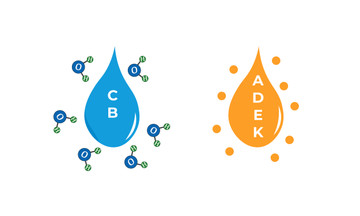Posted by Dee Cee Labs on Mar 11th 2025
Fat-Soluble vs. Water-Soluble Vitamins: What You Need to Know
Vitamins are essential nutrients that play a crucial role in maintaining overall health, supporting immune function, energy production, and cellular repair. However, not all vitamins behave the same way in the body. They are classified into two categories: fat-soluble vitamins and water-soluble vitamins. Understanding the differences between these two types can help optimize nutrient intake, improve absorption, and ensure long-term wellness.
Chiropractors who recommend nutritional supplements to their patients should be aware of these differences to provide targeted advice for bone health, nervous system function, immune support, and overall well-being.
What Are Fat-Soluble Vitamins?
Fat-soluble vitamins dissolve in fat and are stored in the body's fatty tissues and liver. Because of their storage capability, they do not need to be consumed daily, but excessive intake can lead to toxicity.
The four fat-soluble vitamins are:
- Vitamin A – Supports vision, immune health, and skin integrity.
- Vitamin D – Helps with bone health, calcium absorption, and immune function.
- Vitamin E – Acts as a powerful antioxidant that protects cells from oxidative stress.
- Vitamin K – Plays a key role in blood clotting and bone metabolism.
How Fat-Soluble Vitamins Function in the Body
Since these vitamins require fat for absorption, it’s best to take them with a meal containing healthy fats like avocado, nuts, or olive oil. Fat-soluble vitamins are stored in the liver and fat tissues, allowing the body to use them as needed.
While fat-soluble vitamins provide long-term benefits, excessive intake—especially from supplements—can lead to toxicity since the body cannot easily excrete them. For example:
- Too much vitamin A can cause liver damage and bone fractures.
- Excess vitamin D can lead to calcium buildup in the bloodstream (hypercalcemia), affecting the kidneys and heart.
Chiropractic Insight: Fat-soluble vitamins like D and K are essential for bone and spinal health, supporting calcium metabolism and reducing inflammation—both of which are critical for patients recovering from injuries or experiencing chronic joint pain.
What Are Water-Soluble Vitamins?
Water-soluble vitamins dissolve in water and are not stored in the body, meaning they must be consumed daily through diet or supplementation. Any excess is excreted through urine, reducing the risk of toxicity but increasing the potential for deficiencies.
The major water-soluble vitamins include:
- Vitamin C – A powerful antioxidant that supports immune function, collagen production, and wound healing.
- B-Complex Vitamins – A group of essential nutrients that aid in energy production, nervous system function, and red blood cell formation.
Key B-Complex Vitamins and Their Benefits
- B1 (Thiamine) – Supports nerve function and metabolism.
- B2 (Riboflavin) – Essential for energy production and skin health.
- B3 (Niacin) – Helps with brain function and cholesterol management.
- B5 (Pantothenic Acid) – Supports hormone production and metabolism.
- B6 (Pyridoxine) – Crucial for neurotransmitter production and mood regulation.
- B7 (Biotin) – Important for skin, hair, and metabolic health.
- B9 (Folate/Folic Acid) – Vital for DNA synthesis and fetal development.
- B12 (Cobalamin) – Essential for nerve health and red blood cell production.
How Water-Soluble Vitamins Function in the Body
Unlike fat-soluble vitamins, water-soluble vitamins are quickly absorbed and used by the body but not stored for long periods. This means:
- They must be replenished daily through food or supplements.
- Excess is excreted in urine, so toxicity is rare (though megadoses can still have side effects).
- Deficiencies can develop quickly, especially in people with poor diets or absorption issues.
Chiropractic Insight: Water-soluble vitamins like B-complex and vitamin C are critical for nerve function, reducing inflammation, and supporting soft tissue repair. They help patients recovering from chronic pain, injuries, and musculoskeletal conditions.
How to Ensure Proper Vitamin Intake
To optimize nutrient absorption and prevent deficiencies, patients should:
- Take fat-soluble vitamins with meals containing healthy fats for better absorption.
- Consume water-soluble vitamins daily through food or supplements.
- Balance vitamin intake to prevent both deficiencies and toxicity.
- Consider targeted supplementation for those with specific deficiencies, chronic inflammation, or musculoskeletal concerns.
Nutritional Supplements for Comprehensive Support
For chiropractic patients needing musculoskeletal and nervous system support, targeted supplementation ensures optimal intake of essential vitamins to aid in recovery, reduce inflammation, and support long-term spinal health.
Vitamins D3 + K2
Vitamins D3 + K2 helps maintain bone density and spinal integrity by promoting proper calcium absorption. Vitamin K2 ensures that calcium is directed to bones rather than soft tissues, reducing the risk of calcification in arteries and joints. This combination is essential for patients recovering from chiropractic adjustments or dealing with osteoporosis and joint degeneration.
Formula 252 Antioxidant Formula with Vitamin C & E
This High Potency Antioxidant Formula provides powerful antioxidant support to help combat oxidative stress, which can contribute to inflammation and slow recovery. Vitamin C plays a role in collagen formation, supporting joint and tissue repair, while vitamin E protects cells from damage, ensuring faster healing and reduced muscle soreness post-adjustment.
Unique B-12
Unique B-12 supports nervous system function and energy metabolism, making it ideal for patients dealing with neuropathy, fatigue, or muscle tension. Methylated B12 and folate improve nerve communication and red blood cell production, helping to optimize circulation and recovery after spinal adjustments.
These supplements, when combined with chiropractic care and a balanced diet, can significantly enhance spinal health, joint function, and overall well-being.
Final Thoughts
Both fat-soluble and water-soluble vitamins play essential roles in maintaining overall health, supporting musculoskeletal function, and enhancing recovery. Chiropractors can improve patient outcomes by integrating nutrition counseling and recommending high-quality supplements to ensure optimal bone strength, nerve function, and immune support.
By understanding the differences between fat-soluble and water-soluble vitamins, healthcare professionals and patients can make informed decisions about diet and supplementation, leading to better long-term health and well-being.

